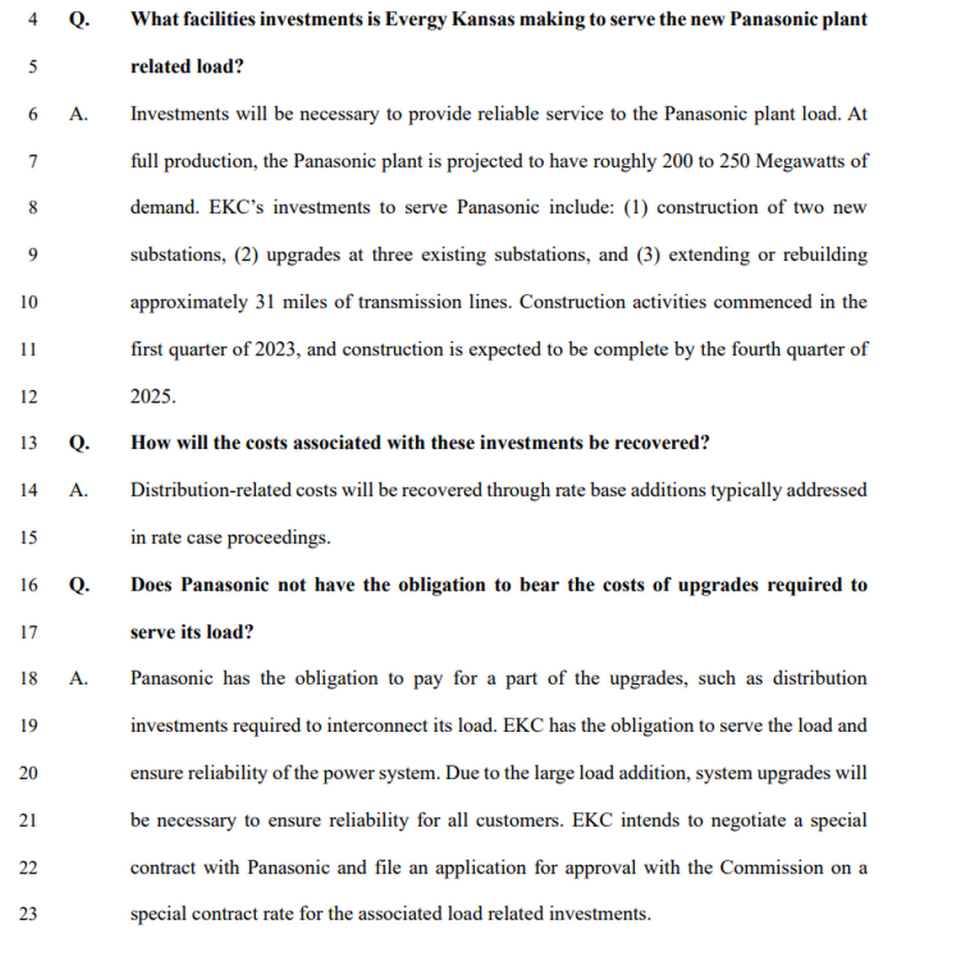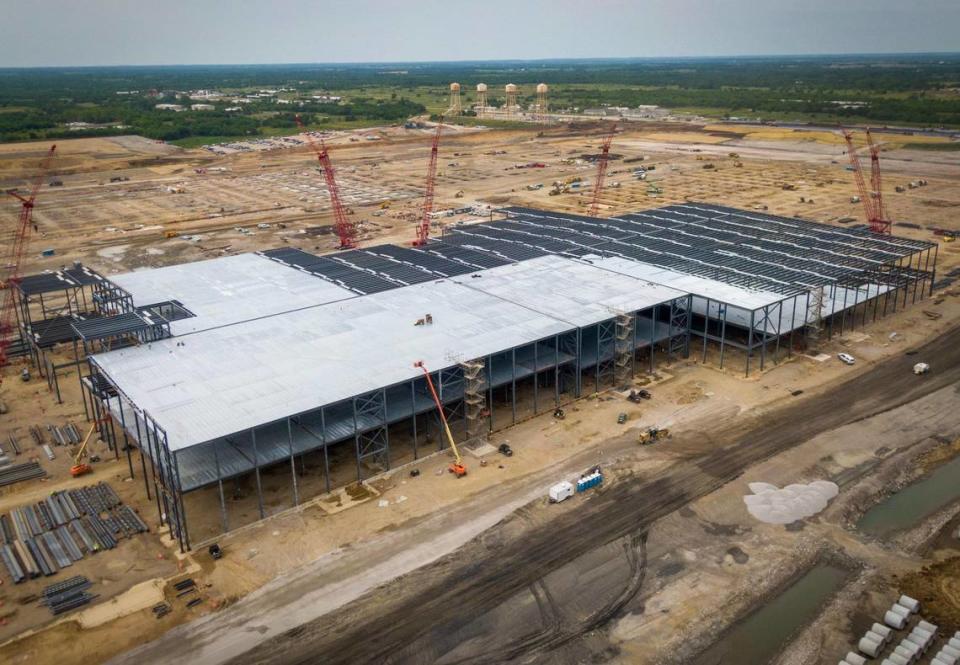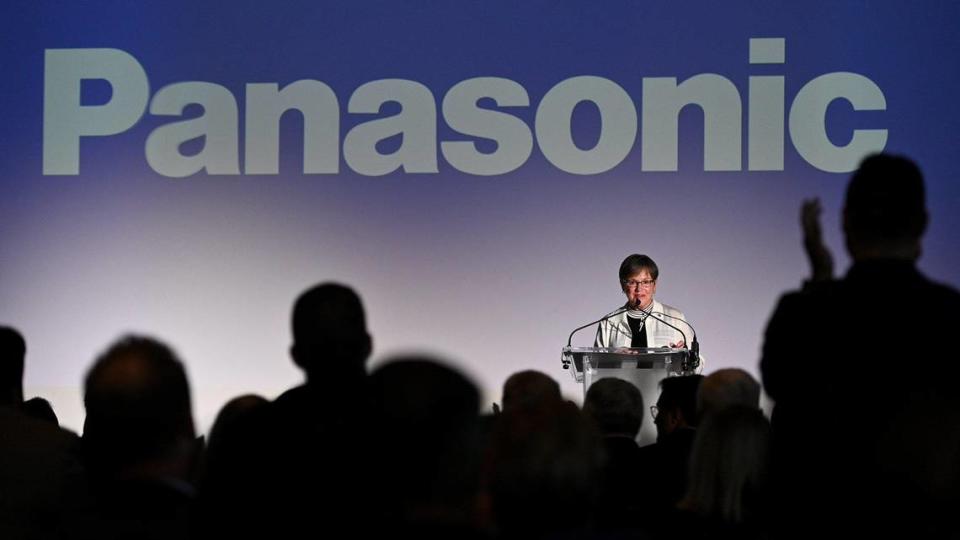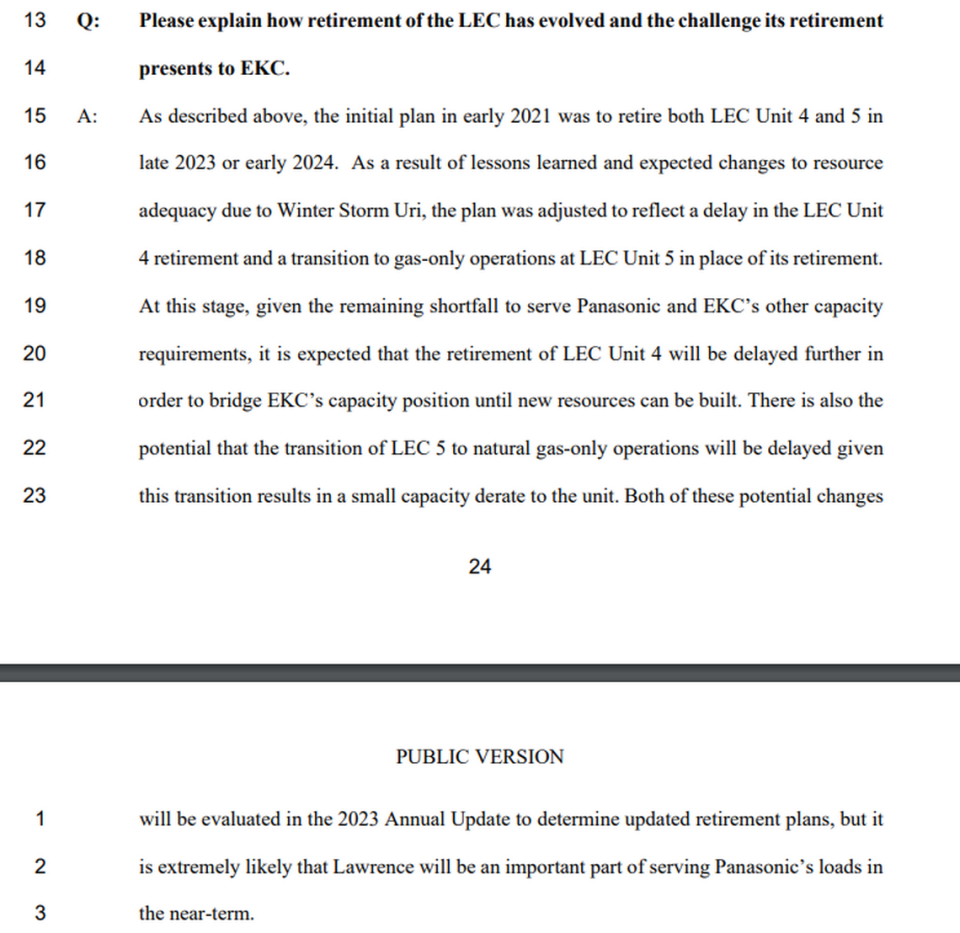Panasonic plant will require so much power, Evergy will seek rate hike in Kansas
Evergy plans to ask for a rate increase in Kansas next year to help pay for the additional infrastructure required to meet the Panasonic battery plant’s massive anticipated demand for electricity, after state regulators decide whether to grant an already-pending rate hike request from the utility.
Documents filed by Evergy with the Kansas Corporation Commission, which regulates utilities, provide details on the intense amount of electricity Panasonic will consume. The demand created by the nearly 4-million-square-foot plant in Johnson County is expected to double that of Evergy’s current largest customer in the state and require two new substations, upgrades to three current substations and work on 31 miles of transmission lines.
Evergy is also citing the Panasonic plant, which will produce batteries for electric vehicles, in saying it will continue to burn coal at a Lawrence power plant until at least 2028. The utility will also delay until then plans to transition part of the plant from coal to natural gas. The decisions have spurred criticism from environmental advocates.
The possibility that Kansas ratepayers may be asked to help shoulder the burden of providing Panasonic with power comes as the international company is already expected to receive as much as $8 billion in federal, state and local incentives and support for the Johnson County battery plant. Panasonic will likely qualify for a discounted electric rate offered to economic development projects.
Evergy, which services eastern Kansas and western Missouri, already announced in April it would ask the KCC to approve raising rates by 5.9% in some areas in Kansas and up to 24.9% in a region that includes Topeka, Wichita and western parts of Johnson County. The commission is expected to make a decision by late December and public hearings are ongoing.
The potential rate hike related to Panasonic would be on top of the other proposed increase.
The utility company’s documents filed with the KCC don’t provide an estimate of the size or scope of the possible rate increase related to Panasonic. Evergy spokeswoman Gina Penzig said Wednesday that the allocation of costs among customers in what it calls an abbreviated case will be determined during the current case.
Evergy says in regulatory filings that following the KCC’s decision, it wants to open an abbreviated rate case within a year. The utility cites investments related to Panasonic, updated costs related to the eventual future decommissioning of the Wolf Creek nuclear power plant in Coffey County, and investments in renewable energy sources in asking for permission to file the abbreviated case. The costs of the Panasonic investments, Wolf Creek updates and renewable energy investments have not yet been determined, Penzig said in a statement.
Kayla Messamore, Evergy’s vice president of strategy and long term planning, described the electrical needs created by the sprawling Panasonic plant in testimony filed with the KCC. Messamore said that while the plant, and related residential and commercial construction, will be great for Evergy’s growth, it creates “near-term challenges from a resource adequacy perspective.”
“Beyond the sheer magnitude of load and load factor, Panasonic’s construction schedule, and, in turn, its energy needs, are being planned on a very aggressive schedule. With energy needs starting to ramp in 2024 and full load requirements by 2026, there is urgency to procure capacity and energy to fulfill the expected energy usage schedule,” Messamore said.
At full production, the Panasonic plant will have roughly 200 to 250 megawatts of demand, according to testimony from Ryan Mulvany, Evergy’s vice president of distribution. The load is equivalent to that of a small city.
Panasonic has the responsibility to pay for part of the upgrades required to provide the plant with power, Mulvany said, but Evergy has an obligation to serve the load and ensure the reliability of the power system. The utility intends to negotiate with Panasonic and file an application with the KCC on a “special contract rate” with Panasonic for investments related to the power load.
“Due to the large load addition, system upgrades will be necessary to ensure reliability for all customers,” Mulvany said.

Resistance to rate hikes
Panasonic announced in July 2022 that it would build a $4 billion battery plant in Kansas after the Republican-controlled Legislature passed and Democratic Gov. Laura Kelly signed a law designed to land the megaproject that will provide $829 million in state incentives to the company. De Soto has committed to another $200 million in local property tax incentives.
While officials say the battery plant, under construction on a portion of the former Sunflower Army Ammunition Plant in De Soto, will employ upwards of 4,000 workers, Kansas obtained no job or salary guarantees from the company. The extensive incentives, as well as the lack of job requirements, has drawn criticism from some legislators who say the deal smacks of corporate welfare.
Rep. John Carmichael, a Wichita Democrat, said the possible rate increase was yet another example of the cost of Panasonic growing far beyond what lawmakers were promised when they approved an incentive package last year.
“This entire project was presented to us on a hurried basis without enough consideration and now it appears the bill is coming due and I fear it’s going to continue to come due,” Carmichael said in an interview last week.

Sen. Rob Olson, an Olathe Republican and former chair of the Senate Utilities Committee, supported incentives to attract Panasonic. But he said the potential increased rates followed a longstanding pattern in Kansas of asking residential payers to foot the bill for corporations.
“We’re already doing that,” Olson said. “The whole problem to what’s been going on in Topeka for years is that you have a shift from business to residential or consumer.”
Olson said he expected Evergy would eventually explain how the infrastructure changes may help other parts of the community rather than Panasonic exclusively.
Rep. Stephanie Clayton, an Overland Park Democrat, said she wouldn’t support moves to increase electric rates for private citizens even though she’s been a strong proponent of business incentives.
“I think that there are opportunities to come to the negotiating table and make sure we are doing this in a way that makes sure this type of growth benefits private citizens. And I do not think that includes raising their electric rates,” she said.
Penzig, the Evergy spokeswoman, said much of the investment related to Panasonic will support expected growth from jobs at the plant and secondary businesses that will come to the area. Panasonic will pay for equipment that is only used by Panasonic, she said.
“As with any new customer – be it residential, small business or large – Evergy upgrades to the system to extend service are embedded in rates for all customers,” Penzig said.
Panasonic will likely qualify for the same economic development electric rates available to any customer bringing a large electric demand to Evergy’s service territory, Penzig said. Adding customers of Panasonic’s size that consistently use electricity helps make the overall power system more efficient and has “a long-term cost benefit to all customers.”
“Many of the existing large industrial customers located currently in Kansas operate under economic development rates,” Penzig said. “At this point, the rates for serving Panasonic have not yet been set and must be approved by the Kansas Corporation Commission.”
Penzig didn’t offer details on the rates Panasonic could receive, but according to Evergy’s website the utility offers incentive programs that provide up to a 40% discount for five years.
Carl Walton, Panasonic Energy of North America’s vice president of strategic initiatives and facilities, said the company remains in ongoing discussion with Evergy about electric rates.
“Panasonic is making a significant investment in upgrading Evergy’s infrastructure to be able to serve the factory, and we will pay for all costs immediately attributable to our operations. We are grateful to Evergy and our other regional partners helping to bring the plant to life and look forward to ensuring the benefits of Panasonic’s presence in the region are widely felt, including through the growth of sustainable energy infrastructure,” Walton said in a statement.
Gov. Kelly has championed the Panasonic project and featured it prominently in her fall reelection campaign. Kelly spokesperson Zach Fletcher said utility infrastructure would have had to expand in the area surrounding the plant regardless because of anticipated growth.
“Panasonic’s energy use will actually cause downward pressure on utility rates making them more affordable causing a net benefit for Kansas rate payers,” Fletcher said in an email.

Evergy to keep coal plant running
In addition to a possible rate increase, Evergy will also keep part of a coal-fired power plant near Lawrence operational longer than originally scheduled, at least partially because of Panasonic.
Even before Evergy learned how much demand Panasonic would create, the utility had already decided to postpone by a year the retirement of coal-fired Unit 4 at the Lawrence Energy Center, originally set for late 2023 or early 2024. Unit 5 was also expected to transition to using natural gas.
But in June, the utility said it will keep burning coal at the plant until 2028 and would then transition Unit 5 to gas to provide power at times of high demand.
“It would be a shame,” Zack Pistora, a lobbyist with the Kansas Sierra Club who helps lead its “Beyond Coal” campaign, said of the delayed closure.
“Not only are we squandering an opportunity to access local Kansas clean energy resources that invest in our state, but it also is not doing anyone else a favor as far as more greenhouse gas pollution.”

As Evergy’s overall load grows, the need for baseload power increases, Penzig said. While more than 50% of Evergy’s power generation is carbon free, she said, “the grid still needs baseload energy for times when intermittent fuels are not operating.”
The decision to extend the use of coal at the Lawrence plant was driven by a systemwide need to ensure Evergy continues to meet customer needs for reliable and affordable energy, Penzig said.
Kelly has always supported an “all of the above” approach to energy policy, Fletcher said, adding that while Evergy has made strides toward carbon-free energy, the utility must assess the needs of customers in providing energy.
“We understand this decision was driven by a system-wide demand and not based on Panasonic,” Fletcher said.
Walton said Panasonic is committed to using renewable energy and reaching net-zero emissions by 2028. Panasonic is working to obtain renewable energy certificates that cover “our full operational load from day one,” he said. The certificates would effectively allow Panasonic to reduce the emissions associated with the plant’s energy use.
Kansas’ abundant wind resources, as well as the potential for additional renewable energy development, also provide a strong base for limiting the carbon footprint of the plant’s electricity consumption, he said.
“These resources are one of the reasons we selected Kansas for our facility,” Walton said.
The Star’s Kevin Hardy contributed reporting

